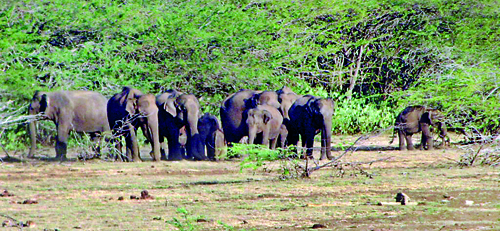News
Drought in Hambantota is open season to kill animals
During the annual drought period in Hambantota, wild animals, such as deer, wild boar, monkeys, elephants and even some wandering cattle, gather around Meti Gaththa lake by the forests in Koholankala, near the Bundala National Park. In the severe heat the lake is reduced to clusters of little pools of water. Usually the animals satiate their thirst and go back into the protected forest.
Earlier this week however, the dried up lake floor was scattered with animal carcasses. Spotted deer lay dead by the muddy water pools, while on nearby leafless trees, bodies of monkeys clutched branches even in death.

Vulnerable: Elephants in search of water. Pic by Krishan Jayaruk
The area wildlife officials discovered that a group of hunters had poisoned the water pools, hoping to sell the bodies of dead animals for meat. The intended targets were the deer and wild boar, whose meat has a significant demand in the black market in the area. All the animals that drank from the pools – the monkeys and perhaps even elephants – died after drinking the poisoned water.
“In the drought season, it’s easier to kill animals,” Hambantota Range Assistant Vijaya Kumara told the Sunday Times.
“The buyers don’t know that these animals were killed by poisoning them. The buyers could fall ill after eating it. Without a toxicology report, it’s hard to tell just by looking at the meat how an animal was killed,” he said.
In recent years, conservationists and wildlife officials have become increasingly concerned about poaching and the black market in wild game trade developing in towns around protected forests and national parks. Wildlife officials say poaching activities are hard to control, especially when poachers employ tactics such as poisoning water bodies.
“Even when we produce poachers in courts, after a while they get out and continue their old activities,” Mr. Kumara said.
Consuming wild game in the southern dry zone is not that uncommon despite hunting or selling wild game being illegal in the country, a professor of zoology, who wished to remain anonymous, told the Sunday Times. As a saying among wildlife activists goes, people in the south consume wild game like people elsewhere eat dried fish.
“Now if you and I go to Kataragama or Tissamaharama and asked for, say, venison, we won’t find it,” Udayanga Pramod, secretary of the Sri Lanka Biodiversity, Conservation and Research Circle, told the Sunday Times. “It is sold in the black market through surreptitious supply chains. This way, illegal wild game end up in hotels and meat markets in the area.”
Hunters may employ various methods from shooting to trapping and even to poisoning animals. During the dry season, this gets worse, Mr. Kumara said. Animals have to keep returning to the same water holes to survive when many of the lakes, wells and rivers dry up, making it much easier for hunters to target them. Also, during this time pilgrims come to Kataragama and Tissamaharama, ending up as prime customers of poachers.
Mostly the demand is for venison and sometimes for wild boar, Mr. Pramod said. Wild boar is not a protected animal, but inside national parks all animals are protected, Department of Wildlife Conservation Director General H.D. Ratnayake said. Sometimes poachers also target pangolin (kaballaewa in Sinhala), which is a very rare and protected animal.
There is no qualitative data for poaching, a professor of zoology said. However, poaching can have a negative impact on wild animal numbers, especially with drought season hunting. When poachers target watering holes, which animals cannot stop coming to, it’s possible that continuous hunting at the location could kill off an entire herd, experts say.
“In some Western countries, there is open season legal hunting,” a zoology professor said. “But there is a scientific method for this. If, for example, deer is in greater numbers in one area, a certain number of male or female animals can be designated for hunting. Here it’s not the case; poachers shoot any animal they can find. Hypothetically speaking, if people kill elephants for meat, with already low figures of elephants, hunting will obviously be detrimental to the elephant population.”
Last week, poaching around national parks issue gained some attention when the Island newspaper and Hiru News quoted Wildlife Conservation Minister Gamini Vijith Vijayamuni de Zoysa accusing guards at national parks of collaborating with poachers, ‘hand in glove’ according to the Island, to illegally hunt wild game. During an initial interview with the Sunday Times, Minister Zoysa said, “that’s not what I said exactly. There could be a possibility though. I don’t remember.” During a follow up interview, he denied having made such a statement. (The Island journalist who wrote the story said he “couldn’t remember it” either.)
Yala National Park Warden G. U. Saranga said he was not aware of any park officials colluding with poachers. Mr. Ratnayake also said the Department hasn’t ‘received any information,’ and that there’s no ‘clear evidence’ of corruption among officials.
“We regularly conduct raids around the park for illegal activities,” Mr. Ratnayake added. “Some villagers enter the park and go poaching. Anyhow we are trying our best to control poaching.”Mr. Pramod, however, said there are reliable reports of certain park officials working with poachers.
“It’s confirmed that this happens, but the job now is to ascertain who does what, when and where,” he said. “Poaching is a serious, widespread issue in Yala, but there are difficulties in reporting. The Department can investigate, take action and advocate against this.”

